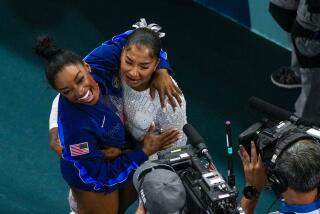U.S. Will Get Good Ride From Bagiu
- Share via
ATLANTA — The search party has reassembled here, somewhat surreptitiously, far outside the fringes of the spotlight soon to be trained on Dominique Moceanu, Shannon Miller and America’s other famous (i.e., female) Olympic gymnasts.
It has arrived under the working code name “United States Men’s Gymnastics Team,” but just in case, every member wears a photo ID and a name tag, just to prove it. In this country, it isn’t easy being male, chalked and bounding toward the vault horse. The women always go first--onto the magazine cover, into prime time, on the front of the cereal box. The men? Well, they’re considered compulsory. Along for the ride, because someone has to carry the luggage.
As John Roethlisberger, four-time U.S. champion, suggests, the only way to change this is to win a few gold medals. The American men are longshots for a team medal--they finished ninth at the most recent world championships--and their highest ranked all-around performer, Blaine Wilson, placed 25th at the world championships.
So, they turn toward each individual apparatus--the vault, the rings, the pommel horse, the bars--and hope for a flash of once-a-lifetime lightning.
They are here, looking for the next Trent Dimas.
Dimas won the gold medal on the high bar in 1992, the first gold by an American male gymnast in a non-boycott Olympics in 60 years. He won it amid zero expectations--he had never even reached the finals in any previous international meet--and qualified for this one as a no-threat sixth place.
Then, the performance of a career--Dimas hit a spectacular triple-back-somersault dismount, stuck a perfect landing and blew away the judges.
Score: 9.875.
Bottom line: Gold, dropped out of the sky.
Four years later, is there another harmonic convergence in the house?
Mihai Bagiu and pommel horse is a pairing that has a chance. Born in Romania and raised in Orange County, Bagiu comes to these Games with the proper out-of-left field credentials. He was the success story of the U.S. trials--last to qualify, had to qualify or he was going broke. He is currently ranked fifth in the world on the pommel horse. And, he is coached by Ed Burch, who in 1992, coached Dimas.
Bagiu (rhymes with “bayou”) is the kind of hit-or-miss gymnast the Olympics deem worthy and embrace every so often. Miss? At the trials, Bagiu scored 9.0 or below in three of his final six exercises. Hit? He was the best in the building on the pommel horse at the trials and on his last routine, the high bar, he nailed a high-risk release move that thrilled the crowd, won over the judges and eliminated Josh Stein for the seventh spot on the roster.
Fred Roethlisberger, John’s father and coach, watched it all. He believes Bagiu is a wild card who, if the stars are aligned, could deliver for the home team.
“If [the Olympics] was a five-event meet, he could almost win the thing,” Roethlisberger says.
Bagiu listened to these words, but said he wasn’t flattered.
“No,” Bagiu says. “Because it’s not a five-event competition, it’s a six-event competition. Rings is my weak event. All that means is that I have to work harder on the rings.”
Bagiu is well-drilled in the if-only and the should-have-done-so. He has been to three world championships but didn’t even qualify for the 1992 Olympic trials. “I haven’t been very consistent,” he says, which is one way to put it. “I’ve had lots of falls. Definitely. At some bad times.”
Last month in Boston, he finally hit one at a good time. Just in the nick of, too. In order to train with Burch, Bagiu has to take up temporary residence in Albuquerque, where Burch’s gym is located. That means housing a family of three--including Bagiu’s wife, Kris, and baby daughter, Gabriela--in an apartment funded by $1,250 monthly stipend checks from USA Gymnastics.
Had Bagiu failed to make the Olympic cut, USA Gymnastics would have cut him off. No more stipends, no more gymnastics career.
“I’d have had to retire and try something different,” Bagiu says. “I’m a certified personal trainer. I’d have had to find a job somewhere in physical therapy.”
Bagiu’s seventh-place finish at the trials bought him time--and one more month’s rent in Albuquerque. Had he finished eighth, he’d probably be watching the Games from his parents’ house in Orange, where the Bagiu family settled after emigrating from Romania in 1979.
“We came here for the American dream, to start a new life,” Bagiu says. “It was easier to get out of Romania then. We already had family living here and declared political asylum. Everything was legal--it wasn’t a defection. We did everything by the law.”
And at the right period of history.
“Now it’s really tough to get out.”
Bagiu was 8 when his family moved to the States, soon to enroll in SCATS gymnastics in Huntington Beach, later to enroll at Marina High School. He became a U.S. citizen in 1989 and joined the U.S. national team three years later.
Now, at 25, he will represent the United States in the biggest international gym meet of all, competing against his native country, which along with Russia and China still ranks as the heavyweights of the sport.
He will have his 30 seconds on the pommel horse, just as Dimas had his on the high bar. It will be over, just like that, but it could last a lifetime.
The American dream, Bagiu might call it. You know his teammates already do.
More to Read
Go beyond the scoreboard
Get the latest on L.A.'s teams in the daily Sports Report newsletter.
You may occasionally receive promotional content from the Los Angeles Times.






